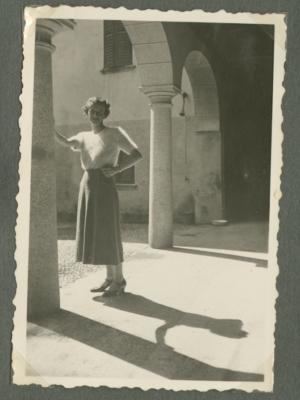Return / To the Beloved / Athens
[translated poetry]
Return
This morning, in the country,
after all winter,
I entered my studio.
There was a nearly suffocating smell:
smell of old walls, it struck me
like the melodies
that resurrect in the heart
the deepest memories.
You know: on that sofa I wept so much
when I knew you wouldn’t come back.
And today, in the doorway,
my soul of that time
took hold of me; in an instant
my entire past returned.
It felt like I was overlooking
a narrow terrace, watching
beneath me, an endless swarm
drowning in nothingness, in the blue.
A slight dizziness seized me
and I went out: outside, beneath the porch
there was a swallow that was frightened,
and it cried out so sharply
I leapt, astonished.
Milan, 1 June 1929
[original text]
Ritorni
ad A.M.C.
Stamattina, in campagna, sono entrata,
dopo tutto l’inverno, nel mio studio.
C’era un odore quasi soffocante:
odor di muri vecchi; mi ha investito
come le melodie che ci risuscitano
in cuore i più nostalgici ricordi.
Sai: su quel divanetto ho tanto pianto
quando ho saputo che tu non tornavi.
Ed oggi, sulla porta, mi ha avvinghiato
la mia anima di allora; ho riassistito
in un istante a tutto il mio passato.
Mi sembrava di essere affacciata
a una terrazza stretta e di guardare,
sotto di me, un brulichio infinito,
affogato nel vuoto e nell’azzurro.
Una lieve vertigine mi ha colto
e sono uscita: fuori, sotto il portico,
c’era una rondine, che s’è spaventata
ed ha squittito tanto acutamente
che ne ho avuto uno stupido sobbalzo.
Milano, 26 maggio 1929
To the Beloved
You came back to me
as the voice
of one who arrives
that suddenly fills the room
when it’s already evening.
Here there was
only the weight
of stiffened hours
in grayness of stone.
The slow pace
of trenches in the lowland
under bare arches of poplars.
At the end of the houses
were the poor November streets
torn by furrows…
And there was this life of mine
repeating every day
the gesture of a hand of flesh
lowered into the depths
to shut God’s mouth.
There was sand
spilling down
on God’s fire.
There was the scythe
biting the herbs of God.
Stone
falling on dogs,
on God’s birds.
Now you’ve come back
you – in me –
as the voice
of one who arrives,
for whom no one is waiting anymore
because it’s already evening.
You returned to me
like a faithful flock of swallows
who hang nests again
on the dark roof of the heart.
You came back
like a swarm of bees
looking for their flowers –
coating the garden gold.
Now in the garden I feel
my new flowers growing
for you. I feel springing up
on pastures,
where the snow has melted,
yellow anemones,
and from the soil of heaven,
the stars that they resemble,
the stars after the frost
of evening prayer has disappeared
and night is the fertile earth –
the spring mountain
of God.
November 1933
All’amato
Tu sei tornato in me
come la voce
d’uno che giunge,
ch’empie a un tratto la stanza,
quando è già sera.
Qui c’era
soltanto il peso
delle ore irrigidite
in grigiore di pietra,
il passo lento
dei fossati in pianura
sotto nudi archi di pioppi. C’erano
al termine delle case
le povere strade
di novembre, straziate di solchi…
E c’era questo mio vivere
che ripete ogni giorno
il gesto di una mano di carne
calata giù nel profondo
a chiudere la bocca di Dio.
C’era la sabbia
che giù si rovescia
sull’incendio di Dio.
C’era la falce
che morde
le erbe di Dio.
La pietra
che cade sui cani,
sugli uccelli di Dio.
Allora sei tornato
tu – in me –
come la voce
d’uno che giunge,
che nessuno più attende
perché è già sera.
Sei ritornato in me
come un fedele
stormo di rondini
che riappendon nidi
al tetto oscuro del cuore.
Sei ritornato come uno sciame
d’api che cercano
i loro fiori – e indorano
l’orto nativo.
Ora nell’orto io sento
crescere i nuovi
miei fiori per te. Sento spuntare
sui pascoli, dove
la neve si è sciolta,
gli anemoni gialli
e dal suolo del cielo
le stelle – che a quelli somigliano –
le stelle – dopo che il gelo
del vespro è scomparso
e la notte è la terra feconda –
il monte
primaverile
di Dio.
6 novembre 1933
Athens
With the dawn
from the sea I’d go up
the high stairs:
waiting skies
bent over
the edges
of the stone.
And the sun flowed over the esplanade.
Warm streams ran in the stems
of the columns,
dense veins opened
with blonde lymph:
the temples rose in the light
like living hands
and I measured through airy fingers
the spaces
of an eternal morning.
20 April 1934/ 28 January 1935
Atene
Con l’alba
dal mare salivo
per alte scalee: si piegavano
cieli d’attesa ai margini
della pietra.
E traboccò per la spianata il sole.
Tepidi fiotti corsero nei fusti
delle colonne,
dense vene si aprirono
di linfa bionda:
si levarono i templi nella luce
come mani vive
e misuravo tra le aeree dita
gli spazi
di un eterno mattino.
20 aprile 1934/ 28 gennaio 1935
TRANSLATOR’S STATEMENT
Antonia Pozzi is a continuing revelation for me. I am still, and will always be, learning the nuances of language and even the gradations of translation, yet her work, above it all, absorbs me. Her life story is clouded by shadows familiar to me, a reader raised on the poetry of Dickinson and Plath: women seeking and imagining agency in a life within which subtler and sophisticated long-standing powers reign. Reading Pozzi’s letters reveals how she understood and navigated the extremes between what one writes to a mother and father, and what one reveals to a lover or friend. One feels her sense of the pressure and weight of the experience of being in the world.
In the poetry, her clear and pure vision is extraordinary. With, for example, “All’amato,” she turns from the poem’s conventions to her magnificent anger, to her bitter understanding saturated with love, and exhibits something brutal about her vision.
Translation is a wonderful country, but I’m unsure that it actually exists except in our desire. Malena Mörling translates Tomas Tranströmer: “A poem is a manifestation of an invisible poem that exists beyond the conventional languages. Therefore, a translation of a poem into a new language is an opportunity to attempt to realize the original (invisible) poem.” In some ways translation is alluring to me because it is an imaginary place that comes into existence as I work, and its promise of reality is strong, feels strong, but is also ephemeral. I admire and even identify with Derek Mong’s thinking about translation—he refers to himself alternatively as a ventriloquist and masquerader—because translation is an act of entering someone else’s being, studying someone else’s voice and world, and that is, to me, somehow more comfortable than proclaiming one’s own voice superior.
I have said in the past that when I translate poetry, I feel like I am an archeologist discovering remains, or a paleontologist, excavating the words as if brushing the earth from the bones of a dinosaur, and assembling them in their lines again, so each articulation is sure. My hope is that the reader brings it all to life: the skeleton’s organs and blood and flesh appear, and the dinosaur begins to move. Yet with Pozzi’s work, the dinosaur simile is not quite right. She’s so contemporary and real to me, the poems feel as if they could be written now, by anyone who feels the world deeply and is navigating her life.
1 “Teaching in Translation: Poet as Translator”
https://www.wordswithoutborders.org/dispatches/article/the-poet-as-translator
2 “Why American Poets Ought to Translate More Poems”
https://kenyonreview.org/2019/05/why-american-poets-ought-to-translate-more-poems/
Antonia Pozzi was a poet and photographer born in Milan in 1912, who took her life in 1938. None of her poetry was published during her lifetime. Among her papers are notebooks containing over 300 poems, a number of which were posthumously altered by her father Roberto and then published. In 1989, editors Alessandra Cenni and Onorina Dino restored the poems to their original form in Parole, an authoritative text of Pozzi’s poetry, the most recently revised edition of which is Tutte le opera (2009) edited by Cenni.
The copyright for the poems and the photograph of Antonia Pozzi belongs to the International Insubric Center “Carlo Cattaneo” and “Giulio Preti” for the Philosophy, the Epistestemologia, the Cognitive Sciences and the History of the Science and Techniques of the University of the Studies of Insubria, depositary and owner of the whole Archive and Library of Antonia Pozzi.
Amy Newman is the author of five books of poetry, most recently On this Day in Poetry History. Her poems have appeared in Poetry, The Missouri Review, The Kenyon Review, The Laurel Review, Narrative, Image, and elsewhere. Her translations of the letters and poems of Italian poet Antonia Pozzi appear in Delos, Cagibi, Poetry, Exchanges, Interim, The Bennington Review, The Arkansas International, and other venues. Among Newman’s awards are a MacDowell Fellowship, the Editor’s Choice Award from Persea Books, and, from Poetry, both the Fredrick Nims Award in Translation and the Friends of Literature Award. She is a Board of Trustees Professor at Northern Illinois University.






